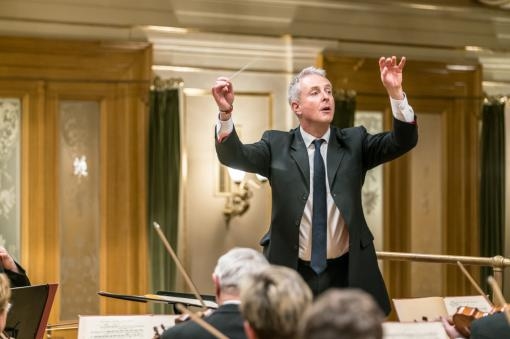Music-lovers in Brno like to remember the visit Wolfgang Amadeus Mozart made to the city at the turn of 1767-68. The theme of the third subscription concert of the Brno Philharmonic from the cycle The Philharmonic at Home I was however the composer’s visit to Prague. And this was not without reason. Prague has an indisputable place in the professional career of the most significant representative of Viennese classicism. To go with the chosen theme the programme creators chose important milestones in the composer’s output that were linked to Prague and its inhabitants. The Brno Philharmonic Orchestra was conducted by Alexander Liebreich and the pianist was Saleem Ashkar.
Informed listeners knew that they would hear the overture to The Marriage of Figaro and that they should not forget either about that to Don Giovanni. Both had already been heard less than two weeks earlier at a concert of the Czech Ensemble Baroque with Adam Plachetka. And although audiences are used to the idea that Mozart’s works are relatively common in concert programmes, to perform both overtures only a fortnight later is possibly a bit much even for lovers of this music. While those interested got the chance to assess and compare two interpretations independently of each other (after all one was played on modern instruments and the second on Baroque ones), I do not think that specifically these two works show the difference between informed and uninformed interpretations most clearly. The Brno Philharmonic Orchestra of course gave a bravura performance of the overtures; and these pieces are part of the key repertoire of each of the world’s orchestras.
The more valuable part of the evening was Mozart’s Piano Concerto No. 20 in D minor as performed by the pianist Saleem Ashkar. This meditative, dreamy, wistful, melancholic piece is ideal for a soothing delicate interpretation by the solo piano. With delicate dynamics and strongly romanticised, even Chopinesque rubato, Saleem Ashkar revealed every sensitive place in this work. The greatest strength of the interpretation naturally appeared in the cadenzas and other solo entrances. There the pianist had most space for freeing the tempo, emphasising the dynamics and highlighting the use of the pedals. Pianists who perform non-Romantic works with Romantic pathos are often criticised for exaggerated use of the pedal. Likewise rhythmic prolixity and denial of the firmly pulsating rhythm of a metronome are among the "transgressions" of romantic pianists. And although both were found in Ashkar’s interpretation to a larger degree, thanks to the musical language of the piece, which still stands on the grounds of Viennese classicism but points to the direction of Chopin’s Romanticism, the result did not sound inappropriate and bizarre as it certainly would in the other Mozart piano concertos. In short Saleem Ashkar captured the spirit of the piece as he hears it and moved it closer to a Romantic understanding.
However it cannot be said that the Piano Concerto No. 20 in D minor does not represent Mozart’s creative spirit. Despite its apparent gloominess, the work is full of Mozart’s characteristic figurations, occasional grotesque shifts in the parts or the typical sweet chromatic melodies that are typical for the composer. Here also there is a palette of unusual orchestral colours. With the exception of minor faults the orchestra was successful in the accompaniment. Perhaps only the excessively aggressive entry of the wind instruments in the second movement disrupted the especially gentle end of a piano phrase.
It would not have been Mozart in Prague if there was not a performance of the Symphony No. 38 in D major, the so-called “Prague”. Especially in this work the conductor can present his grasp of the music, not just an overture, with the refined interpretation, technical and dynamic excellence needed in a true symphony. Alexander Liebreich presents the type of the energetic conductor, who tries to get as much as possible out of the players (and even the audience) – here he jumps to the cellos, there he crouches for the suddenly quietened dynamics of the violins and conscientiously he indicates the entrances. The conductor's expression emanates an undeniable joy in music which often leads to getting the most out of the musicians. The players gave a quality performance in every way. For the most part the dynamics and intonation were not a problem. Sometimes from the orchestra there were some inaccuracies from the flutes and twice in the crescendos there was some scraping from the violins, but the overall sound was balanced and refined.
While the evening offered the works of only one composer, thanks to the piano concerto in the unusually sensitive and romanticised interpretation by Saleem Ashkar it was an event not to be missed by fans of Wolfgang Amadeus Mozart. And if they like Chopin… Those interested will still have an opportunity today and tomorrow in Brno’s Besední Dům.
































No comment added yet..